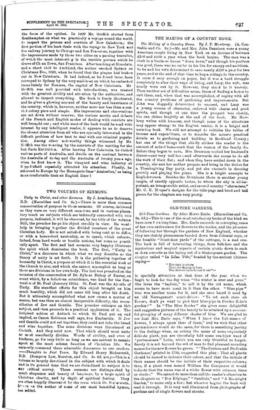IN AN UNKNOWN PRISON LAND.
In an Unknown Prison Land : an Account of Convicts and Colonists in New Catalonia, with Jottings Out and Horne. By George Griffith. With a Portrait and numerous Illustrations. (Hutchin- son and Co: 12s. net.)—New Caledonia and the adjoining islands form a small archipelago lying half-way between Australia and the Fijis which fell into French hands through British remiss- ness about fifty years ago, and has since been turned by them into a penal settlement. It is a country interesting to naturalists) and is a source of some trouble and anxiety in Australia; for Australians dislike a penal settlement so near them, from whence convicts occasionally escape to their shores. Otherwise Mr. Griffith is quite justified in calling it "an unknown prison land"; but his lively and entertaining narrative should go far to destroy the force of the epithet. In 1899 Mr. Griffith started from Southampton on what wa- practically a voyage round the world, to inspect the prisons and convicts of New Caledonia; the first portion of his.book deals with the voyage to New York and the railway journey to Chicago aud San Francisco, together with the impressions made by these two cities on a passing traveller, of which the most interred. g is the terrible picture which he draws of Ch an Town, San Francisco. After touching at Honolulu, and a short visit to Auckland, the author reached Sydney on Christmas Eve, 1899, when he found that the plague had broken out in New Caledonia. It had indeed, as he found later, been conveyed to Sydney by the very mail-boat on which he embarked immeliately for Noumea, the capital of New Caledonia. Mr Griffith was well provided with introductions, was treated with the greatest civility and atts ntion by the authorities, and allowed to inspect everything. His book is freely illustrated, and he gives a glowing account of the beauty and luxuriance of the country, which is, however, neither more nor less than a con- vit colony pure and simple. His impressions and observations are set down without reserve; the various merits and defects of the French and English modes of dealing with convicts are well brought out ; and while most of the book would be read with interest by any intelligent reader, it appears to us to deserve the closest attention from all who are specially interested in the difficult problem of how best to deal with our criminal popula- tion. Among other noteworthy things witnessed by Mr. Griffith was the weaving by the convicts of the matting for the last Paris Exhibition. After leaving New Caledonia he visited various parts of Australia, and dwells on the contrast between the Australia of to-day and the Australia of twenty years ago, when be first knew it. The vineyard and wine industry at S -ppelt afield especially attracted his attention. Finally, he returned to Europe by the Menagerie liner • Attatralien,' as being more comfortable than an English liner!



























































 Previous page
Previous page